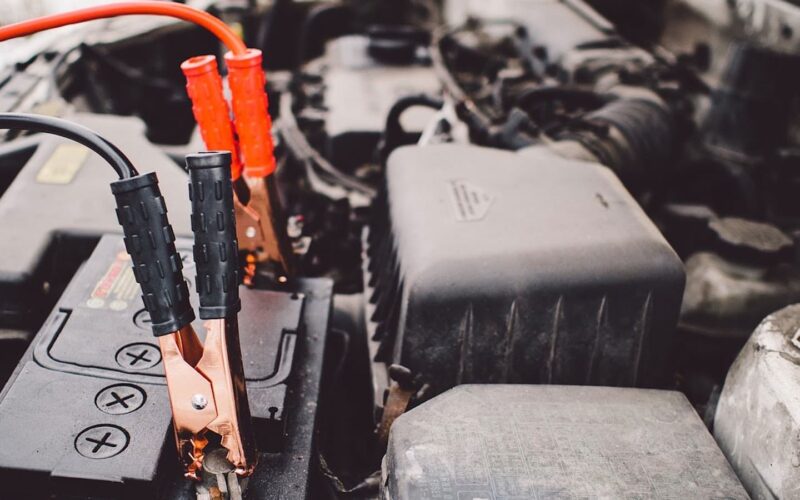Arizona is renowned for its stunning terrains, arid scenes, and notably, the intense heat during the summer. While sun-seekers might find delight in the soaring temperatures, for car batteries, it’s a different story.
In the following sections, we delve into the intricate dynamics of how a vehicle’s battery can be affected by the severe weather conditions in Arizona.
Unraveling the Complex World of Car Batteries
Car batteries are instrumental in not only igniting the engine but also fuelling the vehicle’s electrical frameworks and guaranteeing seamless operation. These powerhouses preserve electrical energy, delivering it to the engine’s starter motor to facilitate ignition. As the engine operates, the alternator ensures the battery replenishes its energy reserves, underscoring the battery’s essential nature in every automobile.
Insights into Factors Shaping Car Battery Lifespan
Several variables come into play, influencing the operational lifespan of car batteries. These factors, especially salient in the context of Arizona’s torrid climate, include:
- Environmental Conditions: Weather patterns and temperature variances have pronounced effects on the battery’s operational lifespan. Arizona’s searing summers exemplify such environmental challenges.
- Operational Patterns: The frequency and nature of vehicle usage, especially short, intermittent drives or extended idle periods, can adversely impact battery life.
- Maintenance Regimen: Consistent and thorough maintenance routines, encompassing terminal cleansing and secure fastening, enhance battery longevity.
- Manufacturing Quality: The make and inherent quality of the battery are instrumental. Elite batteries boast extended operational lifespans.
- Charging Infrastructure: Deficiencies or malfunctions in the alternator or broader charging architecture can stress the battery, curtailing its lifespan.
Coping with Arizona’s Thermal Challenges
Arizona’s thermal environment is notorious, with temperatures soaring beyond 100°F (37.7°C), posing significant challenges to car batteries.
The heightened temperatures hasten the internal chemical processes of the battery, leading to expedited energy depletion. The battery, consequently, labors intensively to sustain energy levels, resulting in shortened operational lifetimes. In the harsh climates of Arizona, car batteries typically endure for a mere 2-3 years, a stark contrast to the 3-5 years in temperate regions.
The intense heat also accelerates the dissipation of the electrolyte, the liquid medium within the battery. A decline in electrolyte levels undermines the battery’s energy retention capability, leading to premature failure.
Deciphering Battery Longevity in Arizona’s Heat
Car batteries in the intense heat of Arizona are typically constrained to a 2- or 3-year operational lifespan. The relentless high temperatures exacerbate battery wear for several reasons:
- Chemical Process Acceleration: The elevated heat amplifies the pace of internal chemical reactions, hastening energy depletion and battery wear.
- Electrolyte Dissipation: The sweltering conditions expedite the evaporation of the internal electrolyte, undermining energy retention and battery longevity.
- Systemic Strains: The vehicular air conditioning and ancillary electrical systems are often overtaxed in the intense heat, imposing additional burdens on the battery.
- Ignition Delays: Extreme temperatures can prolong engine ignition times, imposing additional stresses on the battery.
Harnessing Battery Longevity Amidst the Heat
For individuals in hot climates, prioritizing car battery care is essential, an aspect underscored in earlier deliberations. The selection of thermally resilient batteries and rigorous adherence to maintenance protocols can augment battery life amidst such adverse climates.
Adaptation Strategies in Arizona
Arizona’s intense thermal environment poses notable challenges to car batteries. However, adopting strategic measures can alleviate these stresses. Here are some tailored strategies:
- Battery Selection: Prioritize thermally robust, quality batteries, with a preference for those offering extended warranties.
- Shade Utilization: Endeavor to park vehicles in shaded locales, or employ car covers to mitigate solar exposure.
- Regular Assessments: Institutionalize routine battery inspections, monitoring for corrosion, and assessing electrolyte levels.
- Cleanliness: Combat corrosion through regular terminal cleaning, employing specialized brushes and cleaning solutions.
- Journey Management: Minimize short, frequent trips to alleviate battery strains, consolidating journeys where possible.
- Vehicle Usage: For those with multiple vehicles, alternating usage can ensure consistent battery operation and charging.
- Battery Insulators: Consider the adoption of battery insulators to modulate thermal exposures around the battery.
Armed with these insights, car owners can effectively enhance battery longevity, even amidst the daunting climatic conditions of Arizona.
Analyzing the 5-Year Battery Lifespan in Arizona
A five-year lifespan for a car battery in Arizona is somewhat optimistic. While some superior, heat-resistant batteries with extended warranties might last around five years in Arizona’s extreme conditions, most tend to last between 2-3 years on average.
Persistent high temperatures in Arizona can accelerate the chemical reactions within a car battery, leading to its quicker depletion. The battery’s electrolyte can also evaporate rapidly under intense heat, reducing its capacity and consequently, shortening its lifespan. Battery quality, maintenance practices, and driving habits are other factors that can influence battery longevity in such arduous conditions.
For maximizing a car battery’s lifespan in Arizona, opting for a heat-resistant battery, upholding regular maintenance, and adhering to operational guidelines, like parking in the shade and avoiding frequent short journeys, is imperative. These measures can extend the battery’s life and reduce the risk of unexpected failures amidst the scorching Arizona heat.
Bottom Line
In the blistering heat of Arizona, the durability of car batteries is indeed challenged. While some might anticipate a five-year lifespan for their vehicle’s battery in this extreme climate, it is crucial to have realistic expectations. In Arizona, the average car battery lifespan is typically 2-3 years, primarily due to the incessant heat and its adverse impact on battery operation.
Recognizing the unique challenges associated with Arizona’s climate is the initial step towards ensuring your car battery’s reliable performance. To conquer the heat and enhance the battery’s lifespan, one should secure a heat-resistant battery, prioritize regular maintenance, and adopt best practices, like parking in the shade and minimizing short drives.
Implementing these strategies will instill confidence as you traverse the desert, ensuring that your car battery is equipped to withstand the searing Arizona sun.
